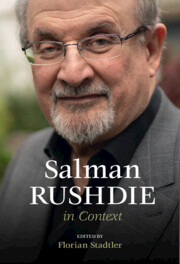Book contents
- Salman Rushdie in Context
- Salman Rushdie in Context
- Copyright page
- Dedication
- Contents
- Contributors
- Acknowledgements
- Introduction
- Part I Life
- Part II Literary and Creative Contexts
- Part III Historical and Cultural Contexts
- Part IV Critical Theoretical Contexts
- Chapter 23 Salman Rushdie and Postcolonialism
- Chapter 24 Salman Rushdie and Cosmopolitanism
- Chapter 25 Salman Rushdie and Postmodernism
- Part V Reception, Criticism, and Adaptation
- Works by Salman Rushdie
- Select Bibliography
- Index
Chapter 24 - Salman Rushdie and Cosmopolitanism
from Part IV - Critical Theoretical Contexts
Published online by Cambridge University Press: 23 March 2023
- Salman Rushdie in Context
- Salman Rushdie in Context
- Copyright page
- Dedication
- Contents
- Contributors
- Acknowledgements
- Introduction
- Part I Life
- Part II Literary and Creative Contexts
- Part III Historical and Cultural Contexts
- Part IV Critical Theoretical Contexts
- Chapter 23 Salman Rushdie and Postcolonialism
- Chapter 24 Salman Rushdie and Cosmopolitanism
- Chapter 25 Salman Rushdie and Postmodernism
- Part V Reception, Criticism, and Adaptation
- Works by Salman Rushdie
- Select Bibliography
- Index
Summary
The complicated reciprocities between self and world, roots and routes, local and global that galvanize theorists and advocates of cosmopolitanism have been career-long preoccupations of Rushdie. Opposed to exclusionary identity politics, cosmopolitan inclusiveness values commonalities of belonging, mixed identities, and respect for others’ lives, values, and cultures. The novel as a genre promotes such principles, and a typical Rushdie novel, with its panoramic and kinetic narrative, large cast of characters, temporal and spatial expansiveness, exuberant fusion of realism and magic, otherworldly forays, and dizzying range of references and allusions, seems to aspire to such inclusiveness in its form and style. Midnight’s Children thematizes an inclusive vision of India (and Bombay as its microcosm) that becomes attenuated and threatened in later novels. Migrant characters and overseas cities dominate The Satanic Verses and the late twentieth- and twenty-first-century novels, but as Rushdie the privileged middle-class Indian migrant author becomes Rushdie the controversial celebrity and member of global elites, cosmopolitanism as an ideal comes under pressure both within his books and in critical discourses surrounding them. This chapter argues that cosmopolitanism, whether achieved or merely aspired to, whether associated with celebratory or limiting visions of rootlessness, remains tenacious in its hold on his and his characters’ imaginations.
Keywords
- Type
- Chapter
- Information
- Salman Rushdie in Context , pp. 305 - 317Publisher: Cambridge University PressPrint publication year: 2023



